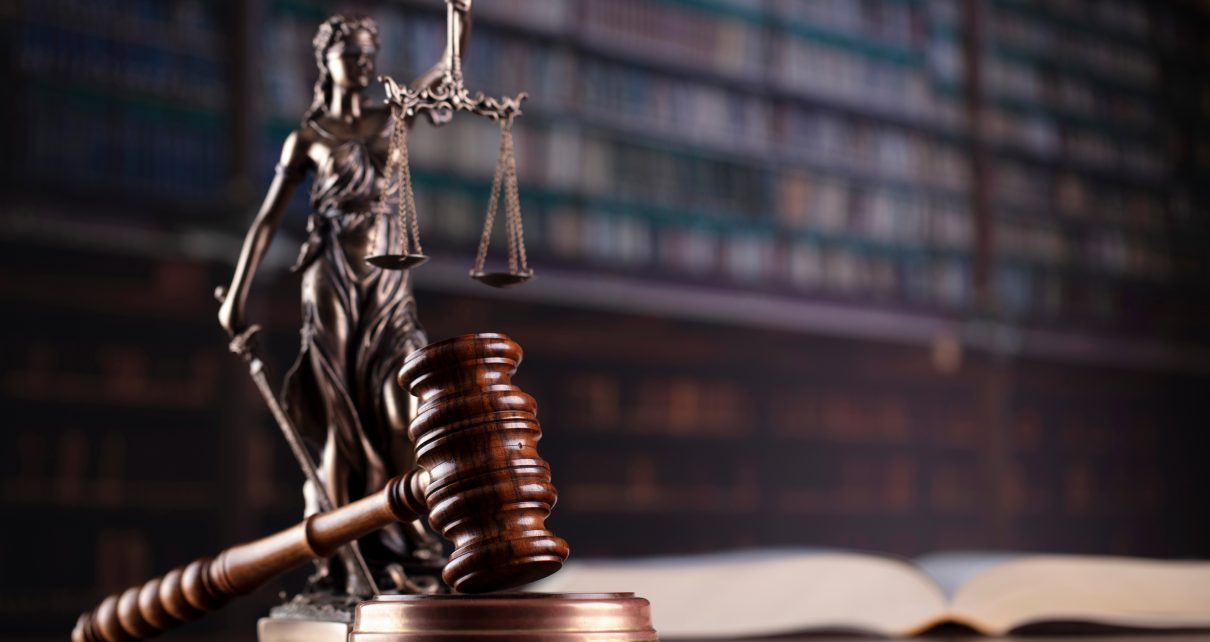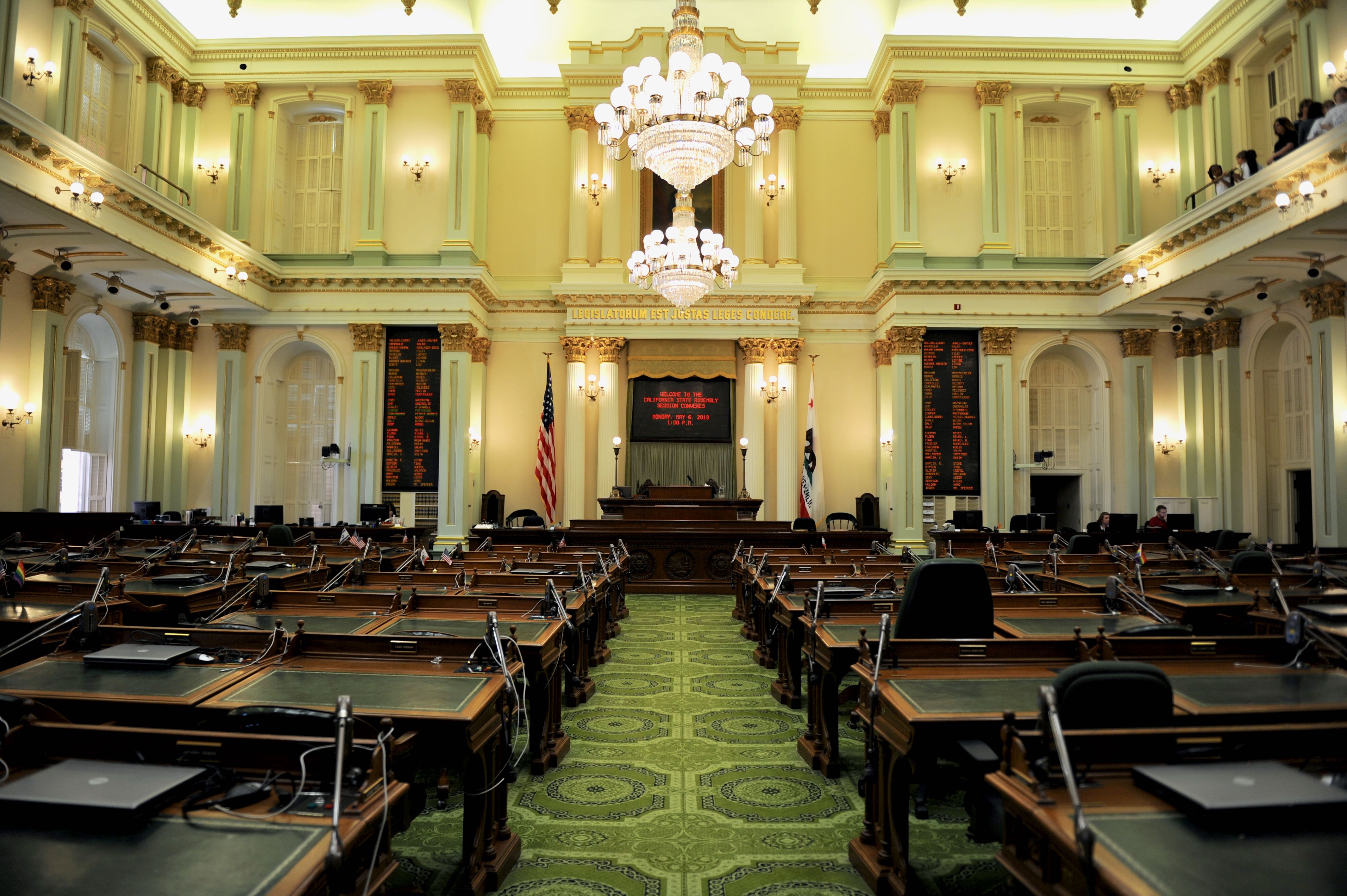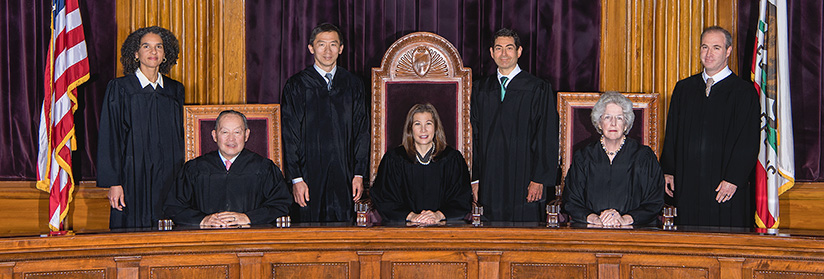
Judge's gavel on courtroom background. Law and justice. (Photo: Zolnierek, Shutterstock)
Provisions of Article VI that Capitol Insiders Should Know
Article VI deals with the judicial branch of California government
By Chris Micheli, September 12, 2024 1:00 pm
California’s Constitution, like its federal counterpart, provides for the three branches of state government. Article VI deals with the judicial branch of California government. This article highlights the major provisions of Article VI that those working in and around state government should know.
Section 1 – Judicial Power
“The judicial power of this State is vested in the Supreme Court, courts of appeal, and superior courts, all of which are courts of record.”
Section 2 – Supreme Court
The Supreme Court consists of the Chief Justice and 6 associate justices. The Chief Justice may convene the court at any time. A judgment requires 4 judges present at the argument. An acting Chief Justice performs the Chief Justice’s functions when the CJ is absent or unable to act.
Section 3 – Judicial Districts
The Legislature divides the State into districts with a court of appeal with one or more divisions. Each division consists of a presiding justice and 2 or more associate justices. A judgment requires 2 judges present at the argument. An acting presiding justice performs the presiding justice’s functions when the PJ is absent or unable to act.
Section 4 – Superior Courts
In each county, there is a superior court of one or more judges. The Legislature prescribes the number of judges and provides for the officers and employees. In each superior court, there is an appellate division. The Chief Justice assigns judges to the appellate division for specified terms.
Section 6 – Judicial Council; Administrative Director; Judicial Reports
The Judicial Council consists of the Chief Justice and one other judge of the Supreme Court, three judges of courts of appeal, 10 judges of superior courts, two nonvoting court administrators, and any other nonvoting members as determined by the voting membership of the council, each appointed by the CJ for a 3-year term; four members of the State Bar appointed by its governing body for 3-year terms; and one member of each house of the Legislature appointed as provided by the house. The JC may appoint an Administrative Director of the Courts. The CJ makes recommendations annually to the Governor and Legislature, adopt rules for court administration, practice and procedure, and perform other functions prescribed by statute. The Chief Justice needs to expedite judicial business and to equalize the work of judges. Judges are required to report to the JC concerning the condition of judicial business in their courts.
Section 7 – Commission on Judicial Appointments
The Commission on Judicial Appointments consists of the Chief Justice, the Attorney General, and the presiding justice of the court of appeal of the affected district. When a nomination or appointment to the Supreme Court is to be considered, the presiding justice who has presided longest on any court of appeal will sit on the CJA.
Section 8 – Commission on Judicial Performance
The Commission on Judicial Performance consists of eleven members. All terms are for four years, and members cannot serve more than two four-year terms, or for more than a total of 10 years if appointed to fill a vacancy.
Section 9 – State Bar of California
The State Bar of California is a public corporation, and every person admitted and licensed to practice law in this State is a member of the State Bar, except while holding office as a judge of a court of record.
Section 10 – Court Jurisdiction; Court Comment on Witnesses
The Supreme Court, courts of appeal, superior courts, and their judges have original jurisdiction in habeas corpus proceedings, as well proceedings for extraordinary relief in the nature of mandamus, certiorari, and prohibition. Superior courts have original jurisdiction in all other causes. “The court may make any comment on the evidence and the testimony and credibility of any witness as in its opinion is necessary for the proper determination of the cause.”
Section 11 – Courts’ Appellate Jurisdiction; Legislature Can Determine Amount in Controversy; Appellate Division Jurisdiction; When Jury Trial Does Not Occur
“The Supreme Court has appellate jurisdiction when judgment of death has been pronounced.” Courts of appeal have appellate jurisdiction when superior courts have original jurisdiction and in other causes prescribed by statute. The Legislature may change the appellate jurisdiction of the courts of appeal by changing the jurisdictional amount in controversy. The appellate division of the superior court has appellate jurisdiction in causes prescribed by statute. The Legislature may permit courts exercising appellate jurisdiction to take evidence and make findings of fact when jury trial is waived or not a matter of right.
Section 12 – Transfer of Cases; Supreme Court Review
The Supreme Court may, before a decision is issued, transfer to itself a cause in a court of appeal, or from one court of appeal to another appeals court. The Supreme Court may review the decision of a court of appeal in any cause.
Section 13 – Grounds for Setting Aside Judgments or Granting New Trials
A judgment cannot be aside, nor can a new trial be granted, on the ground of misdirection of the jury, or of the improper admission or rejection of evidence, or for any error as to any matter of pleading, or for any error as to any matter of procedure, unless the court is of the opinion that the error complained of has resulted in a miscarriage of justice.
Section 14 – Publication of Opinions; Writing Decisions with Reasons
The Legislature provides for the prompt publication of the opinions of the Supreme Court and courts of appeal as the Supreme Court deems appropriate. Decisions of the Supreme Court and courts of appeal must be in writing with reasons stated.
Section 15 – Eligibility to Be a Judge
In order to be a judge of a court of record, the person must have been a member of the State Bar or served as a judge in this state for the 10 years immediately preceding their selection as a judge.
Section 16 – Supreme Court Retention Elections; Term of Office; Superior Court Judges; Selection of Superior Court Judges; Declaration of Candidacy; Filling Appellate Court Vacancies
Judges of the Supreme Court are elected at large and judges of courts of appeal are elected in their districts at general elections at the same time and places as the Governor. Their terms are 12 years beginning the Monday after January 1 following their election. Judges of superior courts are elected in their counties at general elections. Terms of judges of superior courts are six years beginning the Monday after January 1 following their election. A vacancy can be filled by election to a full term at the next general election or the Governor can appoint a person to fill the vacancy temporarily until the elected judge’s term begins. And appellate court judges may file a declaration of candidacy to succeed to the office presently held by the judge. The Governor fills vacancies in appellate courts by appointment. A nomination or appointment by the Governor is effective when confirmed by the Commission on Judicial Appointments
Section 17 – Outside Activities of Judges; Running for Another Office; No Personal Use of Fines or Fees; Not Earning Retirement Service Credit
A judge of a court of record may not practice law, and is ineligible for public employment or public office other than judicial employment or judicial office. However, a judge of a court of record may accept a part-time teaching position that is outside the normal hours of his or her judicial position and that does not interfere with the regular performance of his or her judicial duties while holding office. If running for other public office, the judge must take a leave of absence without pay prior to filing a declaration of candidacy. Acceptance of the public office is a resignation from the office of judge. A judicial officer may not receive fines or fees for personal use. A judicial officer may not earn retirement service credit from a public teaching position while holding judicial office.
Section 18 – Disqualification of Judges; Suspension; Removal from Office; Discipline of Judges; Supreme Court Review; Immunity for Commissioners; Judicial Ethics
A judge is disqualified from acting as a judge, without loss of salary, while there is pending (1) an indictment or an information charging the judge in the United States with a crime punishable as a felony under California or federal law, or (2) a petition to the Supreme Court to review a determination by the Commission on Judicial Performance to remove or retire a judge. The CJP may disqualify a judge from acting as a judge, without loss of salary, upon notice of formal proceedings by the commission charging the judge with judicial misconduct or disability. The CJP must suspend a judge from office without salary when the judge pleads guilty or no contest or is found guilty of a crime punishable as a felony under California or federal law or of any other crime that involves moral turpitude. If the judge is suspended and the conviction becomes final, the CJP has to remove the judge from office. In addition, the CJP may retire a judge for disability that seriously interferes with the performance of the judge’s duties and is or is likely to become permanent, or censure a judge or former judge or remove a judge for action that constitutes willful misconduct in office, persistent failure or inability to perform the judge’s duties, habitual intemperance in the use of intoxicants or drugs, or conduct prejudicial to the administration of justice that brings the judicial office into disrepute, or publicly or privately admonish a judge or former judge found to have engaged in an improper action or dereliction of duty. Upon petition by the judge or former judge, the Supreme Court may, in its discretion, grant review of a determination by the commission to retire, remove, censure, admonish, or disqualify a judge or former judge. Members of the commission, the commission staff, and the examiners and investigators employed by the commission are absolutely immune from suit for all conduct at any time in the course of their official duties. The CJP makes rules implementing this section. The Supreme Court is required to make the Code of Judicial Ethics for the conduct of judges, both on and off the bench, and for judicial candidates in the conduct of their campaigns.
Section 18.1 – Jurisdiction of the Commission on Judicial Performance
The Commission on Judicial Performance exercises discretionary jurisdiction with regard to the oversight and discipline of subordinate judicial officers, according to the same standards, and subject to review upon petition to the Supreme Court. A person who has been found unfit to serve as a subordinate judicial officer after a hearing before the Commission can no longer serve as a subordinate judicial officer.
Section 18.5 – Disclosures by Commission of Judicial Performance of Judicial Discipline; Confidential Information
Upon request, the Commission on Judicial Performance provides the Governor or the President, or the Commission on Judicial Appointments, the text of any private admonishment, advisory letter, or other disciplinary action together with any information that the Commission on Judicial Performance deems necessary to a full understanding of the commission’s action, with respect to any applicant whom the Governor or President indicates is under consideration for any judicial appointment. This information is confidential and privileged, but is provided to the applicant. The term “private admonishment” is defined.
Section 19 – Compensation of Judges
The Legislature prescribes compensation for judges of courts of record.
Section 20 – Retirement for Judges
The Legislature provides for retirement, with reasonable allowance, of judges of courts of record for age or disability.
Section 21 – Temporary Judges
If both parties agree, a court may order a cause to be tried by a temporary judge who is a member of the State Bar.
Section 22 – Subordinate Judicial Officers
“The Legislature may provide for the appointment by trial courts of record of officers such as commissioners to perform subordinate judicial duties.”
- Probate Code Could Be a Basis for Statutory Interpretation Principles - February 22, 2026
- Conservation Banks - February 22, 2026
- Mergers of Unincorporated Associations - February 21, 2026




